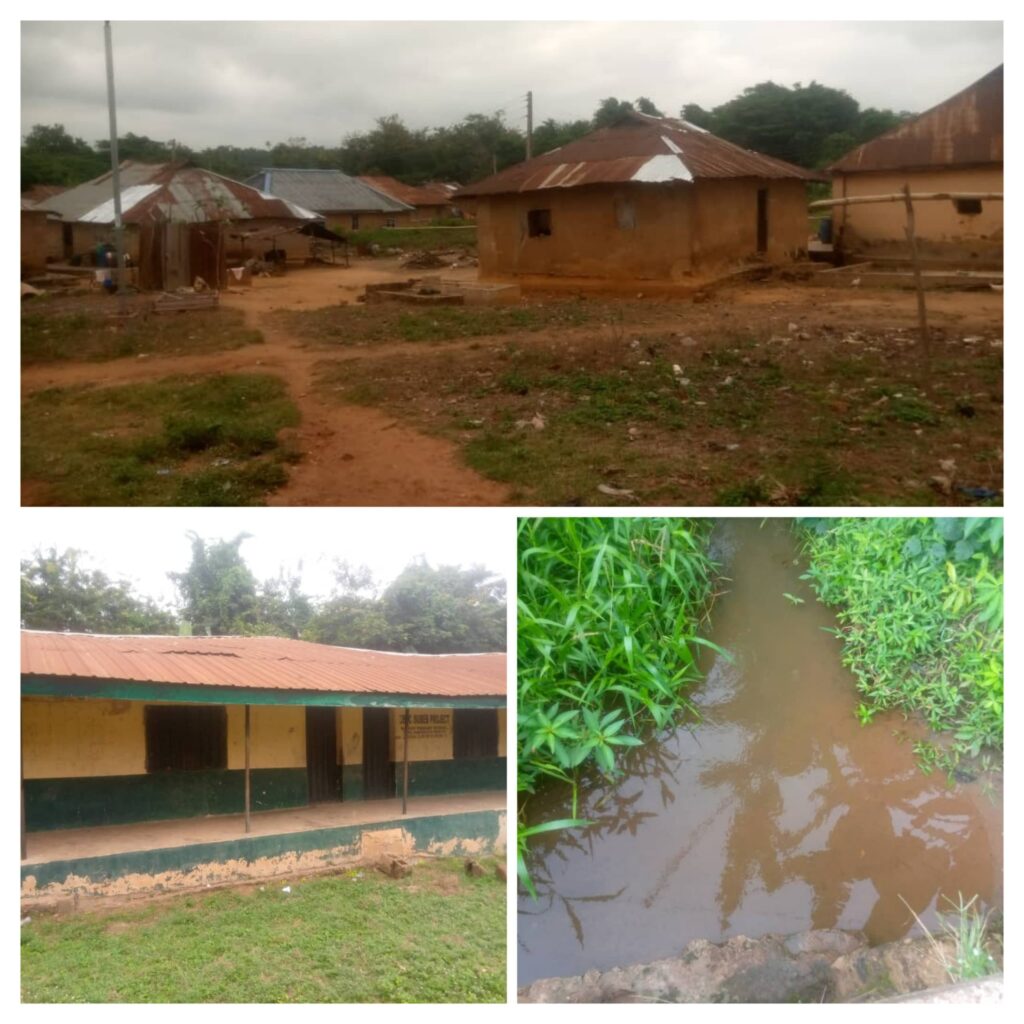Mosindi Chinonso, Esemuze Peter, Adelakun Ayomide, Adebowale Zikirotlah & Odekoya Iyanuoluwa
In the northern outskirts of Abeokuta, Ogun State, lies Tibo township, a historic settlement that predates even the founding of modern Egba land. Once celebrated as the home of the “sons of sixteen rivers,” Tibo is today better known for its abandonment, poverty, and hardship.
Despite its cultural heritage and deep historical significance, the town has become a picture of neglect—cut off from healthcare, safe water, and functional infrastructure. For the residents, survival has become a daily battle, with each passing year deepening their sense of exclusion from the state’s development map.
PLATFORM TIMES visited the community and found that the plight of Tibo reflects not just one town’s misfortune but the broader crisis of rural neglect in Nigeria.
… A Town of Rivers, But No Clean Water
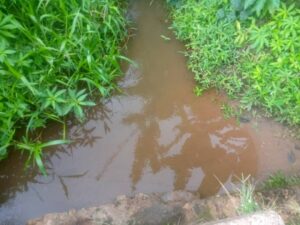
PLATFORM TIMES gathered that Tibo’s 16 rivers are woven into folklore, once believed to cure illnesses and bless barren women. According to the residents of the community, streams like Odo Gada,heal elephantiasis, and Odo Olomowewe, believed to give children to the childless, drew pilgrims from across the region.
But today, these same rivers are the sole water source for residents. They fetch water directly for drinking, cooking, and bathing, even though livestock also drink and defecate in them.
PLATFORM TIMES further gathered that the community’s only borehole, provided by a rural water development scheme over a decade ago, broke down and was never repaired. During the rainy season, families also rely on collected rainwater, but in the dry months, dependence on the rivers is absolute.
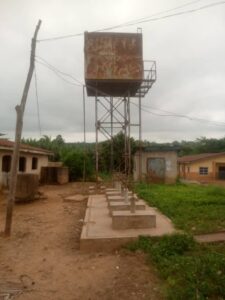
The consequences are grim. PLATFORM TIMES also gathered that there have been reports of recurring cholera outbreaks, cases of typhoid, and skin diseases, especially among children. Women recounted instances of children suffering severe diarrhea, with little or no access to treatment.
According to UNICEF (2023), more than 86 million Nigerians lack access to safe water, and about 70,000 children under five die yearly from waterborne diseases. Tibo’s situation illustrates how national statistics translate into community tragedies.
Elderly resident, Madam Felicia Adegbite, lamented: “We drink from the same river where cows and goats drink. Many children fall sick, but there is nowhere to treat them. We only pray nothing serious happens.”
… No Health Centre, Rising Maternal Risks
Perhaps the most striking evidence of neglect is the absence of a health facility. Tibo, which oversees over 40 satellite villages, has no clinic, no dispensary, and no trained medical staff.
Women deliver babies at home, often with the help of traditional birth attendants (TBAs), who, though experienced, lack modern medical knowledge or equipment. Complications that would require urgent medical attention often result in tragedy.
A young mother, Adebisi, shared her ordeal:“when I was in labour, my family called a woman who delivers babies at home. There was no doctor, no nurse. If something had gone wrong, I may not be alive today. We only depend on God.”
Many residents who spoke wtih PLATFORM TIMES said emergency cases—whether childbirth, accidents, or sudden illnesses—require them to trek several kilometers to Olorunda or travel by poor road to Abeokuta. According to them, the delays often prove fatal.
According to the World Health Organization (2023), Nigeria’s maternal mortality ratio is 1,047 deaths per 100,000 live births, one of the highest in the world. Rural women, who face distance and lack of skilled care, are most at risk.
Child health is equally alarming. Immunization campaigns rarely reach Tibo, leaving children vulnerable to measles, polio, and tetanus. Residents recalled instances where measles spread across households, unchecked due to lack of vaccines or medical supervision.
… Education in Decline, Future At Risk
Education in Tibo is a story of survival against odds. The town manages only one primary school—Baptist Primary School, built in 1951.
Although renovated in 2022, the building is inadequate for the community’s growing population.
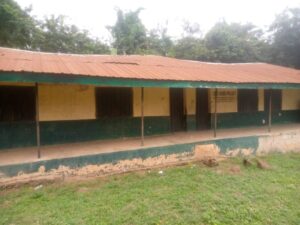
The school is also grossly understaffed, with only a handful of teachers for dozens of pupils. Many classes are merged, while some children sit on bare floors due to lack of desks.
For secondary school, children trek about 4 kilometers to Olorunda. Some eventually drop out, either because of the distance or because parents cannot afford transportation and books.
Nigeria currently has over 20 million out-of-school children, the highest in the world (UNESCO, 2023). Experts warn that communities like Tibo could become hotspots for illiteracy, child labor, and poverty if urgent measures are not taken.
…Living in Darkness for Over a Decade
PLATFORM TIMES reports that Tibo’s nights are silent and dark. More than 10 years ago, government officials delivered poles, wires, and a transformer to the town as part of an electrification project. But the project was abandoned midway.
From the observation by PLATFORM TIMES, the poles have collapsed, and the transformer has become a home for rodents and reptiles. A few households run small petrol generators, but rising fuel prices have made this unsustainable.
The broader picture is grim: 92 million Nigerians live without electricity (World Bank, 2022). For Tibo, the absence of light means not just darkness, but insecurity, stunted economic activity, and exclusion from modern life.
… Roads Of Death
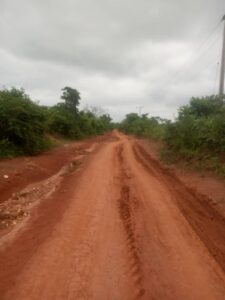
Reaching Tibo requires navigating what residents call “roads of death.” The only access route is riddled with gullies, deep potholes, and collapsed sections.
During the rainy season, the road becomes nearly impassable, cutting off the community from markets and health facilities.
Residents told PLATFORM TIMES that accidents are common, with motorcycles frequently toppling over while attempting to navigate the road.
According to the National Bureau of Statistics (2021), Ogun State is among states with the poorest rural road infrastructure in Nigeria. For Tibo, this translates to isolation, poor healthcare access, and economic stagnation.
… The People’s Plea
Despite the hardship, Tibo remains a community of resilience and dignity. Residents are not asking for luxuries, only the basics: a functional health center with trained staff ; clean water supply through boreholes or safe water schemes; electricity to power homes and small businesses: good roads to connect with neighboring towns: more teachers and support for education ; and a community hall to foster youth engagement and decision-making.
The Adele Ilu (regent), Mr. Joseph Olushesi, summarized their frustration, saying, “government officials and journalists come here, take pictures, make promises, and leave. Nothing changes. We are suffering in silence.”
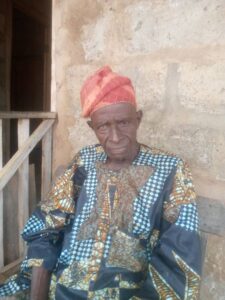
Findings by PLATFORM TIMES show that Tibo’s story is far from unique. Across Ogun State and Nigeria, rural communities face the same challenges: absence of healthcare, lack of clean water, poor roads, and broken promises.
In 2022, a survey by the National Primary Health Care Development Agency (NPHCDA) revealed that more than 70% of rural Nigerians lack access to functional primary health centers.
Similarly, rural electrification remains sluggish, with many communities abandoned mid-project, just like Tibo.
Some experts who spoke with PLATFORM TIMES warn that without urgent intervention, rural poverty will deepen, fueling migration to urban slums and worsening Nigeria’s inequality crisis.
For now, Tibo—the land of the sixteen rivers—remains suspended between its historic past and uncertain future. Its people continue to draw strength from their heritage, but their hope is that one day, government attention will match their resilience. Until then, Tibo stands as a sobering reminder that while cities expand, rural Nigeria is quietly bleeding.
This Special Report was produced by The Voice Team ; 6th Set, Mass Communication Department, Al-Hikmah University in conjunction with Ebenezer Obey Music Life and Institute Study Centre, Abeokuta, Ogun State.
Do you want to share a story with us? Do you want to advertise with us? Do you need publicity for a product, service, or event? Contact us on WhatsApp +2348183319097 Email: platformtimes@gmail.com
We are committed to impactful investigative journalism for human interest and social justice. Your donation will help us tell more stories. Kindly donate any amount HERE

